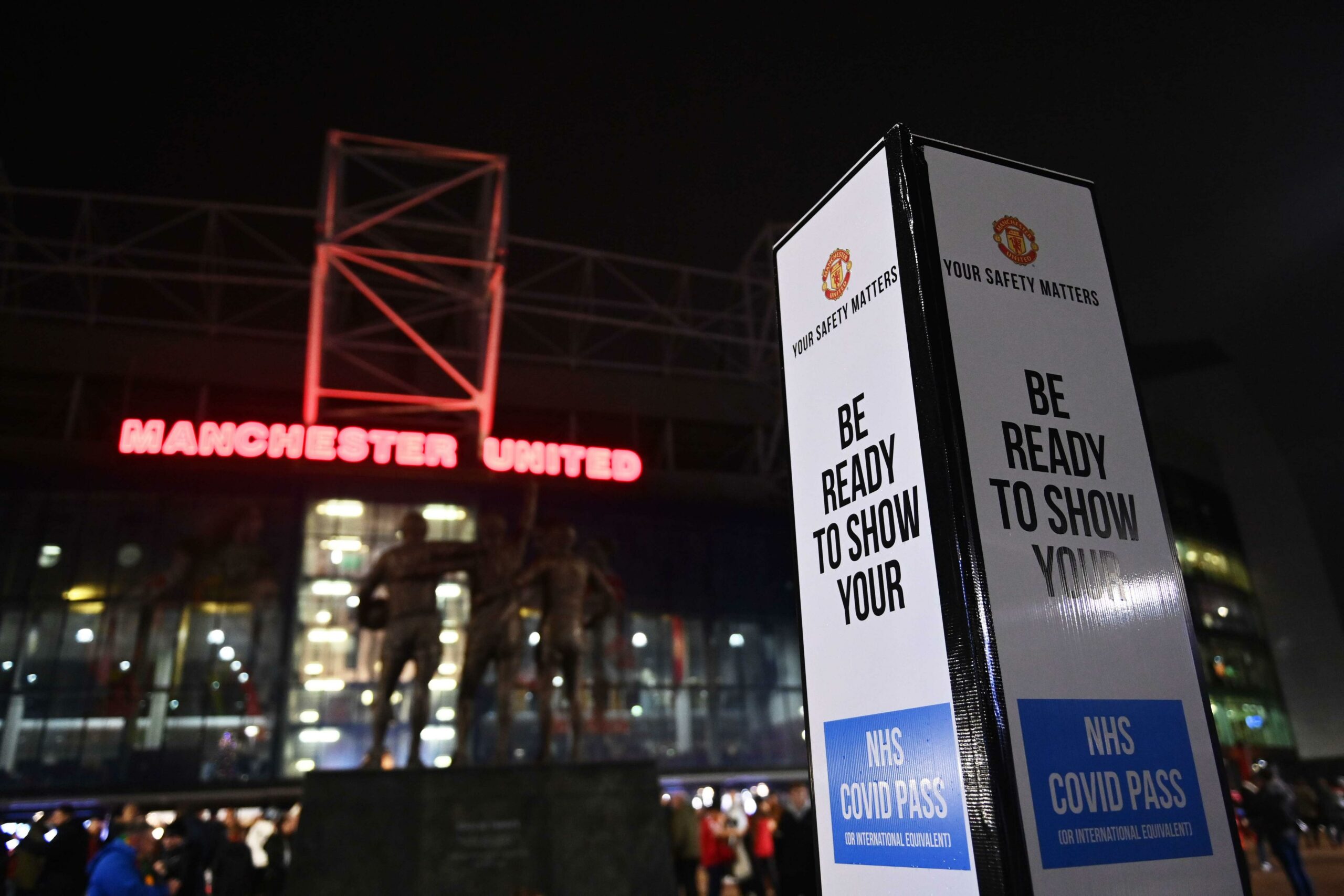
Dan Mullan/Getty Images – A NHS Covid Pass banner is seen outside the Old Trafford stadium in Manchester, England, Dec. 30, 2021.
Venues in England won’t have to ask their visitors for health proofs from next week.
UK prime minister Boris Johnson announced today, Jan. 19, that the country’s so-called Plan B restrictions to tackle coronavirus will expire on Jan. 26
Plan B, which came into effect in December, most notably introduced face masks in most indoor settings as well as the requirement for visitors above 18 years of age to show proof of full vaccination, a negative test no older than 48 hours or some form of exemption if they wanted to enter certain venues and events.
These restrictions will be lifted again next week, as the latest data showed that infection levels were falling and scientists believed the Omicron wave had peaked nationally, as Johnson explained in today’s questioning session (PMQs) in parliament.
Masks are also no longer mandatory in schools or on public transport, and there’s no more guidance to work from home either. The requirement to self-isolate if tested positive for coronavirus remains in place until March 24, when it is set to expire, and Johnson said he didn’t expect to renew it.

Andrew Milligan/PA Images via Getty Images – Fans show their COVID passes upon entry before a Premiership match at Celtic Park in Glasgow, Scotland.
While the COVID pass remains in place for certain venues and events, the number of spot checks they are required to do has been reduced from 50% to 20%.
As associations representing various trades in the UK have been pointing out, the requirement to self-isolate led to staff shortages, most notably in the UK’s health care sector.
The UK’s Night Time Industries Association (NTIA) welcomed today’s lifting of restrictions, at least in England, “following an extremely difficult two years for the night time economy and hospitality sector, which has been, in every sense, at the sharpest end of the pandemic throughout, we are finally able to plan for the future with some level of certainty and without debilitating restrictions,” according to an NTIA statement.
There’s positive news coming from Scotland and Wales, as well. The Scottish government, after already lifting capacity restrictions on outdoor events earlier this week, decided to reopen nightclubs, allow large-scale indoor events, and drop social distancing rules – the most important factor for venue operators and promoters to turn a profit.
The changes will take effect from Monday, Jan. 24, “after a significant fall in new case numbers,” as the
BBC reported. The requirement to show a COVID pass, i.e. proof of vaccination or negative test, will remain in place for certain venues, but not be extended.
The Welsh decision makers lifted all restrictions at outdoor events in time for the famous Six Nations rugby tournament next month, which can now be played in front of full crowds. From Jan. 28, nightclubs and indoor concerts can reopen as long as the audience shows proof of vaccination or a negative test.
The rules in Northern Ireland were still the same as at the end of last year at press time, meaning: face masks continue to be mandated in hospitality and most other indoor venues. A COVID pass is required for nightclubs, theaters, conferences and exhibitions, as well as indoor events above 500 capacity, where not everyone is seated, and outdoor events above 4,000 capacity, with not everyone seated. For events above 10,000 capacity, it doesn’t matter how many people sit or how many stand – a health proof needs to be shown upon entry.

NTIA – Michael Kill
CEO of the UK’s Night Time Industries Association.
NTIA CEO Michael Kill hopes the other UK nations aside from England will also scrap vaccine passports entirely” “With the devastating losses in hospitality and night time economy businesses over the festive period, and effects of limited cash flow being felt across the UK, our industry has been placed in an extremely fragile state. Vaccine Passports play a considerable part in the continual trading losses associated with this difficult period, with businesses reporting up to 30% loss in trade directly related to this mitigation,” he explained.
Kill continued, “Frustratingly, at no point have we been privy to evidence or justification to substantiate the decision behind adopting this mitigation, exacerbated further by the data emerging from all four UK territories. This scheme has been damaging for the late night sector in particular, without ever being demonstrated to achieve the purported objectives, and it is now time to draw a line under it and move on with a consistent approach to other parts of the UK.
“Experts believe it will take several years for the hospitality and night time economy sectors to recover, but what is important today is for the Government to set aside their political agenda and put people and businesses at the sharpest end of the pandemic first.”


